| EMPLOYMENT
SCREENING NEWS |
Some
Members of Civil-Rights Panel Accuse EEOC of Overreach on Racism
Some members
of the U.S. Commission on Civil Rights say that a federal panel
is, in the interest of fighting racism, engaging in bureaucratic
overreach and making it harder for businesses to avoid hiring
felons. The panel's report, targets the U.S. Equal Employment
Opportunity Commission over its guidelines for businesses conducting
background checks of potential employees. The guidelines warn
businesses that such checks could expose them to racial discrimination
claims. The EEOC's 2012 Guidance states that any employment
policy that disfavors persons with criminal records "disproportionally
affects racial and ethnic minorities, particularly black or
Hispanic with criminal records nationwide," and then instructs
them on ways to avoid rejecting those applicants based on a
race or ethnic group's "higher than average likelihood of a
criminal history." But some members of the civil rights panel
argue in a 350-page report that the EEOC's guidelines are "deeply
flawed" and so vague as to be useless. It also argues that the
EEOC's language and arguments would confuse laymen more than
clarify questions and put employers in a no-win situation regarding
lawsuits - either they will be sued for racism if they use background
checks or be held accountable for ex-felons' on-the-job actions
if they don't.
Read more
Read
the full report

Background
Check Firms Sign Deal on Automatic Rejections in New York
Four background
check companies signed agreements in New York State to avoid
illegal hiring practices, the New York State Attorney General's
Office announced Thursday. The background check firms include
HireRight Inc., First Advantage, General Information Services
Inc. and Sterling Infosystems.
The deals
prohibit the agencies from automatically disqualifying applicants
with criminal records, according to the Attorney General's Office.
The deals also call for the agencies to defer hiring decisions
to employers, who must conduct an individualized consideration
of candidates in accordance with New York law.
The background
check firms specifically agreed not to issue automatic rejection
letters to job applicants because of a conviction on behalf
of employers to ensure the employers conduct individualized
assessments of the candidates, according to the Attorney General's
Office.
"New Yorkers
who have paid their debt to society deserve a fair shot at employment
opportunities," Attorney General Schneiderman said. "Background
check agencies that implement blanket bans on hiring ex-offenders
are violating New York State law."
Read more

What's a Predictive Score?
Most consumers
know that creditors use information about them and their credit
experiences - like the number and type of accounts they have,
their bill paying history, and whether they pay their bills
on time - to create a credit score, which helps predict how
creditworthy they are. What most consumers don't know is that
data brokers offer companies scores for other purposes unrelated
to credit - for example, for marketing, advertising, identity
verification, and fraud prevention. Businesses use these scores
to decide which transactions require further scrutiny, what
offers and prices to offer certain consumers, and even in what
order to answer customer service calls.
Some have
raised concerns about consumers' awareness about what's going
on and the accuracy of the data used to create these predictive
scores. Others wonder how these scores might be used in the
future. To explore these questions, the FTC held a seminar,
continuing its Spring Privacy Series
on March 19, 2014, with a seminar on Alternative Scoring
Products . Topics included:
·
What kinds of predictive scores are being used now? What are
they used for? How will they be used in the future?
·
What kind of information is used to create these scores? How
accurate is this information?
·
What are the benefits of these predictive scores?
·
Are there privacy concerns associated with these scores?
·
What consumer protections should be provided; for example, should
consumers have access to these scores and the underlying data
used to create them?
For
more information

Employment
Background Checks: FTC, EEOC Offer Tips for Employers and Job
Applicants
Hiring decisions are among the most important choices for any
employer, but the process can be complex. For the first time,
the Federal Trade Commission (FTC) and the Equal Employment
Opportunity Commission (EEOC) have co-published two short guides
on employment background checks that explain the rights and
responsibilities of the people on both sides of the desk.
The FTC
and the EEOC want employers to know that they need written permission
from job applicants before getting background reports about
them from a company in the business of compiling background
information. Employers also should know that it's illegal to
discriminate based on a person's race, national origin, sex,
religion, disability, or age (40 or older) when requesting or
using background information for employment.
At the
same time, the agencies want job applicants to know that it's
not illegal for potential employers to ask someone about their
background as long as the employer does not unlawfully discriminate.
Job applicants also should know that if they've been turned
down for a job or denied a promotion based on information in
a background report, they have a right to review the report
for accuracy.
Find more
tips in the brochures,
Background Checks: What Employers Need to Know
and Background Checks:
What Job Applicants and Employees Should Know .
Read more



| EMPLOYMENT
SCREENING NEWS - continued |
U.
S. Chamber, NAPBS and CDIA Event Highlights Ongoing Concerns
with EEOC Guidance on Criminal History
On Thursday
March 6th, the U.S. Chamber of Commerce together
with NAPBS and the Consumer Data Industry Association (CDIA)
hosted an event highlighting the importance of background checks
and the continued challenges posed by EEOC's 2012 criminal history
Guidance.
The day
included CDIA's president, Stuart Pratt, offering statistics
from a recent survey regarding consumer perceptions of the use
of background checks by employers. The survey of consumers indicated
that there continues to be widespread support for employers
continuing to rely on screens to make informed hiring decisions.
The day also included a panel discussion that included several
large employers and a small business.
Following
the employer panel, attendees were treated to a thoughtful interview
of former EEOC General Counsel Don Livingston by Mary Kissel
of the Wall Street Journal.
Finally,
a panel of legal experts discussed the impact the Guidance has
had on the EEOC's enforcement practices.
"In response
to the Guidance, employers have made substantial investments
in time and resources to ensure compliance," said Judy
Gootkind, NAPBS Board Chair. "Yet there is a serious
disparity among businesses based on size. The reality is that
small businesses are hard-pressed to afford a compliance adjudicator
and even large companies that have the resources aren't seeing
a return on their investment when they try to comply with an
EEOC that has simply failed to adequately and clearly define
disparate impact."
Read more

An
Honest Recap on Safe Harbor
The recent
vote at the European Parliament-by an overwhelming majority
of 544 to 78 members-calling for the immediate suspension of
Safe Harbor has sent some powerful shockwaves across the business
and legal communities in the EU and beyond. This should not
have come as a surprise, but it is still a chilling reminder
of the uncertainty surrounding the scheme-possibly the most
widely relied upon mechanism to legitimise data flows between
the EU and the U.S. The big question that remains is whether
EU-based organisations that rely on Safe Harbor as the legal
basis for transferring data to either their own corporate group
entities or service providers operating in the U.S. are doing
the right thing or should be looking for alternatives. One thing
is clear: Safe Harbor is not a silver bullet for compliance.
It should be regarded as a well-established set of principles
that can act as the basis for a fully-fledged global privacy
programme. What really matters is to be able to show, both internally
within an organisation and externally to third parties, that
beyond the words and the paperwork, there is real evidence of
commitment to the protection of personal information.
Read more

Employer Access to Employee Social Media: Applicant Screening,
'Friend' Requests and Workplace Investigations
A recent
survey of hiring managers and HR professionals reports that
more than two in five companies use social networking sites
to research job candidates. This interest in social networking
does not end when the candidate is hired. In fact, companies
are seeking to leverage the personal social media networks of
their existing employees, as well as to inspect personal social
media in workplace investigations. As employer social media
practices continue to evolve, individuals and privacy advocacy
groups have grown increasingly concerned about employers intruding
upon applicants' or employees' privacy by viewing restricted
access social media accounts. A dozen states already have passed
special laws restricting employer access to personal social
media accounts of applicants and employees, and similar legislation
is pending in at least 26 states. Federal legislation is also
under discussion. These state social media laws restrict an
employer's ability to access personal social media accounts
of applicants or employees, to ask an employee to "friend" a
supervisor or other employer representative and to inspect employees'
personal social media. However, while state laws differ significantly,
the general message is clear: employers must evaluate their
current practices and policies to ensure compliance with these
laws.
Read more

American Camp Association Urges National System for Employee
Background Checks
As summer
camp season approaches, the American Camp Association is urging
passage of a law that would make the screening of potential
employees and volunteers more possible. "A gaping hole" exists
in federal law that keeps camps and other youth organizations
from accessing federal criminal background checks, said Peg
Smith, chief executive of the American Camp Association. "Most
parents assume there's a national system and there's not," she
said. She urges passage of the Child Protection Improvements
Act introduced in the Senate in July by Sen. Charles Schumer.
The bill would set up a single clearinghouse to process background
checks - either within the FBI or overseen by the FBI. Currently,
the federal system is accessible in fewer than half of states,
said Elena Rocha, director of youth development policy and partnerships
for YMCA of the USA. "FBI checks are a critical part of an effective
screening strategy," she said. Under the Schumer legislation,
a clearinghouse would approve organizations that could use the
service. Potential employees or volunteers would be able to
see their history and challenge the accuracy of it.
Read
more

Background
Check Didn't Show Accused Child Molester's Past Sex Crime Accusation
Brian Dean
taught Bible classes at Kingspoint Christian School up until
he resigned. The school principal says he reported an incident
involving a 13-year-old girl. Now he's charged with a felony
sex crime and it's the second time he was investigated for questionable
behavior around young girls. The first time didn't show up on
a state-operated website for background checks and a software
loophole could be to blame. Washington Access to Criminal History
is run by the State Patrol and allows a subscriber access to
the criminal record of anyone in the state. The case file shows
Dean gave a group of young girls a naked photo of himself when
they came to his door soliciting donations. The prosecutor didn't
think it met the standard for indecent exposure, and charges
were never filed. "Someone can be arrested in the state of Washington,
charged with a crime, but it's never prosecuted or they're never
convicted of that crime, in that case, it would not show on
the website database," said Trooper Chris Thorson. State agencies
utilize the database as well, which could leave a gaping loophole
for those accused, but never convicted.
Read more

| Welcome
to the U.S. Legal Challenge Question! |
Sponsored
By:


As the background
screening industry continues to get more competitive the firms
that will ultimately succeed will be those that create competitive
advantage through their people by offering continuous learning
opportunities to heightened their knowledge and capabilities.
We believe that having employees that are very knowledgeable about
the legal landscape of background screening is essential to continued
success.
We are grateful
to Larry D. Henry who began his law career with the Army JAGC
where he tried over 2,000 cases. After the Army he relocated to
Tulsa. In 1981, the founder of DAC Services contacted Mr. Henry's
firm for assistance in creating a background screening company.
Since Mr. Henry's practice was employment law, the firm believed
this fell within his area and as they say: "the rest is history".
His practice has kept him in continual contact with the background
screening industry, and he is a nationally recognized expert in
the area of background screening.
Mr. Henry's
practice is concentrated on employment law and in specific, background
screening of employees. He represents consumer reporting agencies
throughout the United States and two national trade associations.
He is the author of the Criminal Records Manual and the on line
reference site:CRAHelpDesk.com, and he is a frequent presenter
across the country on various topics dealing with background screening.
Please choose
your answer by clicking on it:
| EMPLOYMENT
SCREENING NEWS - continued |

Background
Checks Stalled as Firefighter Arrests Mount
Nine D.C.
fire department employees came forward in response to an agency
call to report undisclosed prior arrests and driving infractions
ahead of a plan to conduct criminal-background checks on 1,800
first responders. But those background checks are now on hold
as agency officials and the firefighters union wrangle over the
manner in which they are conducted. Fire Chief Kenneth B. Ellerbe
called for the criminal-background checks in order to identify
those who failed to disclose prior charges amid a series of employee
arrests that has now reached 14 since October. In response to
the series of arrests, Chief Ellerbe issued a special order in
January that gave employees 10 days to report any prior infractions
from the past three years or face termination if infractions were
later uncovered. "The majority of the members who self-reported
disclosed traffic-related offenses that impacted their driver's
licenses," said fire department spokesman, Tim Wilson. Chief Ellerbe's
special order did not specify how or when the background checks
would be conducted. Edward Smith, president of the D.C. Fire Fighters
Association, expressed concern over the type of information -
including personal financial data - that could be unearthed during
background checks and who would have access to it.
Read more

State
Board of Education Approves Background Checks for All Teachers
All teachers
will now have to undergo background checks, under a policy approved
9 to 1 by the State Board of Education. The policy requires all
people renewing teaching licenses to be fingerprinted. Since 2002,
all applicants for new teaching license or those wanting to renew
an expired license, had to submit fingerprints for background
information from KBI and FBI. "The significance is that this bill
will create more fingerprints and backgrounds," said Scott Gordon,
Kansas State Department of Education. "They will be able to get
access from every teacher licensed in the state of Kansas and
it will comply with the Senate bill recently passed." Board members
say the new background checks will create a systematic process
for ensuring that nothing slips through the cracks.
Read more

South Dakota Panel OKs Background Checks
for Economic Agency
The South
Dakota House State Affairs Committee has passed a bill to require
background checks of officers and employees of the Governor's
Office of Economic Development. Representatives voted unanimously
to support the measure. An amendment introduced in the committee
hearing replaced the entire content of the bill. It previously
called for the Legislature to oversee economic activities in the
state without any specifics. The economic development agency has
been under federal and state investigation because of allegations
of misconduct. The bill would require criminal background checks
by the Federal Bureau of Investigation. Any employees of the agency
who have access to account numbers or authorize financial assistance
would be subject to the background checks.
Read more

Official Says Principal Accused of Torching School Came
Recommended, Passed Background Checks
A principal
accused of setting fire to the North Dakota high school where
he worked had passed background checks and came recommended by
clergy and mentors in other states. Thomas Sander is charged with
felony arson and endangering by fire or explosion after a fire
that heavily damaged Trinity High School and forced its closure.
He remained jailed in lieu of a $500,000 cash bond. "He's a graduate
of a well-known and prestigious prep school in St. Louis. He has
graduate degrees in administration," said Monsignor Patrick Schumacher,
the board chairman for Dickinson Catholic Schools. "With his qualifications,
recommendations and work ethic, we made the decision to hire him."
The Dickinson job was Sander's first full-time principal position,
according to Schumacher. He said Sander had a good work ethic
but did make some mistakes. "I will not say there were no issues.
But I will say there's no way in my mind the issues could have
added up to this." He declined to say if Sander was sanctioned
for any reason during his tenure. "There's a lot of speculation
as to how this may have happened," he said. "There are no answers."
Classes were called off for the week.
Read
more

| BACKGROUND
SCREENING INSIGHTS |

Providing Private Database-Only Criminal Records
By Derek
Hinton
I'm telling
you, every time I run across a CRA that is providing private database-only
searches without verification, I get a sickly premonition akin
to watching old footage of Patsy Cline singing "I Fall to Pieces."
This practice
of database-only criminal record reporting made news again recently
in Chicago. A Chicago Tribune report revealed that a new ride
sharing company, Uber, "did not check some of the criminal records
of its drivers, allowing thousands of drivers to ferry passengers
for months, despite not knowing whether or not they had felony
convictions."
The Tribune
later determined that "the driver had a 2010 Cook County felony
conviction for residential burglary, which should have barred
him from partnering with the company." Uber acknowledged their
multistate background checks have missed an "unknown" number of
county-level criminal convictions, including the Chicago ride-share
driver's felony.
Missing critical
information is one thing that can go wrong for a CRA or employer
when employing a database-only search. The other thing that can
go wrong, the other side of the coin, is not missing offenses,
but reporting information that should not be reported. To be clear,
providing a database-only criminal record is not illegal if contemporaneous
notice is provided to the applicant at the time of the reporting.
However, that doesn't make it a good idea even if everyone agrees
on the definition of contemporaneous.
Read
more

| EMPLOYMENT
SCREENING NEWS |
FBI
Balks at Pot Background Checks in Washington but Conducted Checks
in Colorado
The FBI is refusing to run nationwide background checks on people
applying to run legal marijuana businesses in Washington state,
even though it has conducted similar checks in Colorado -- a discrepancy
that illustrates the quandary the Justice Department faces as
it allows the states to experiment with regulating a drug that's
long been illegal under federal law. Washington state has been
asking for nearly a year if the FBI would conduct background checks
on its applicants, to no avail. The bureau's refusal raises the
possibility that people with troublesome criminal histories could
wind up with pot licenses in the state -- undermining the department's
own priorities in ensuring that states keep a tight rein on the
nascent industry. The Obama administration has said it wants the
states to make sure pot revenue doesn't go to organized crime
and that state marijuana industries don't become a cover for the
trafficking of other illegal drugs. At the same time, it might
be tough for the FBI to stomach conducting such background checks
-- essentially helping the states violate federal law. The Justice
Department declined to explain why it isn't conducting the checks
in Washington when it has in Colorado.
Read more

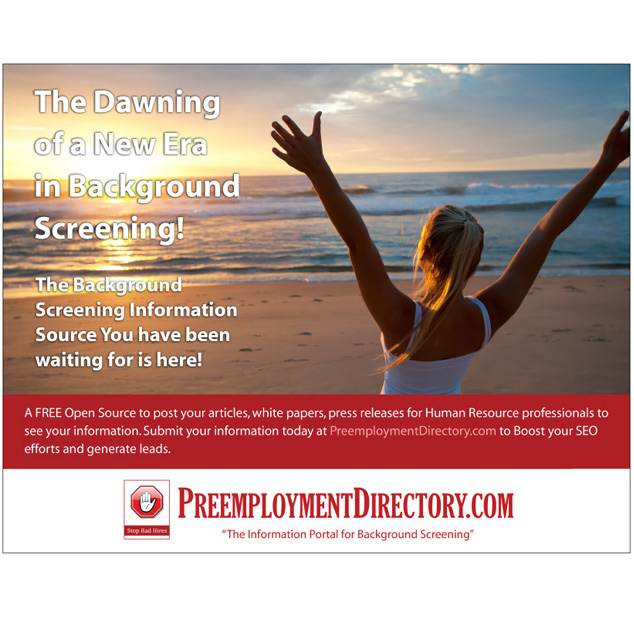

Cruise
Lines Don't Conduct Background Checks of Their Crew Members
Cruise lines don't vet their crew members. The foreign flagged,
foreign incorporated cruise industry delegates the obligation
to third-party foreign hiring agents to try and screen the applicants.
Countries like Indonesia, India, and the countries in the Caribbean
& Central America have no computerized electronic database
of criminals, sex offenders, or pedophiles which can be carefully
cross referenced with social security numbers, driver's license
numbers, and passport numbers. There is no infrastructure in a
place like Nicaragua or Goa to search to make certain that the
prospective employee isn't a sociopath. There are no U.S. HR specialists
involved. It's a random, unsophisticated, "hit-or-miss" task conducted
(or not) by hiring agents far-far-away who make money when they
place people from around the world on U.S. based cruise ships.
The system is often based on bribery. Falsification of a resume
is not only a common practice, it's often required by the cruise
lines' hiring agents. Think your cabin attendant is carefully
screened? No country in Central America or the Far East has a
state-of-the-art database tied to someone's criminal history.
If a pedophile shows up with a certificate from who knows where
that he is not a criminal, he's welcome aboard.
Read more

Background Check Firm's Slipup Could Cost It
A company that provides background checks must face claims from
a man whom it allegedly incorrectly described as a sex offender,
costing him work, a federal judge ruled. Harold Charles Meyer
claims that National Tenant Network (NTN) sent an inaccurate consumer
report to Meyer's prospective employer and landlord, Shorewood
RV Park, claiming he had "three criminal sex offense record, which
were listed as 'violent sex offender, fail to register,' 'sexual
battery' and 'aggravated oral sexual battery.'" Both Harold and
Phyllis Meyer, who had applied with him for the assistant resident
manager position, were then denied employment and residence at
Shorewood. The couple contacted the NTN for copies of Harold's
file but the defendant allegedly never responded to their requests.
They blamed the inaccurate sex-offender designation on NTN having
mistakenly relied on the consumer reports of several other individuals
with similar names. One surviving count alleges that NTN improperly
bars those whom it provides with consumer reports, like Shorewood,
from disclosing the contents of those reports to the subjects,
like the Meyers. However, the Meyers failed to allege that "NTN
either knew or should have known that the report it furnished
to Shorewood was for employment purposes," according to the ruling.
Read
more

Bill
to Drug Test Pharma Employees Filed in U.S. House of Representatives
A bill introduced
February 18, 2014 in the U.S. House of Representatives would require
registered manufacturers and distributors of controlled substances
identified under the Controlled Substances Act to perform criminal
background checks and drug testing for employees with access to
controlled substances. The measure, "Ensuring Patient Access and
Effective Drug Enforcement Act of 2013" (H.R. 4069), would require
registrants, as a condition of registration, "(A) to obtain a
criminal background check on each of the registrant's employees
who has or will have access to facility areas where controlled
substances under the registrant's possession or control are stored,
such as a cage, vault, or safe; and (B) to perform drug testing
on each such employee in accordance with the Federal and State
law." The background checks would have to be conducted at least
every two years, and upon hire, once the bill was enacted. Civil
penalty provisions for failing to comply with the new mandates
are included in the law. The Attorney General would have authority
to issue regulations and guidelines to carry out the amendments.
The bill has been referred to the House Energy and Commerce, and
Judiciary Committees.
Read more

Child Care Workers Must Complete Criminal Background Checks
Under Senate Bill
The Senate
has voted 96-2 to reauthorize a $5 billion annual grant program
that provides childcare for 1.6 million children. It includes
a new requirement that all providers who care for children with
federal funding complete criminal background checks and learn
first aid. The bill includes amendments added by Sens. Mary Landrieu,
D-La. and David Vitter, R-La. Landrieu's amendment requires states
to develop disaster plans for childcare centers. Vitter's amendment
requires enforcement of a long-established requirement of the
childcare grants that priority be given to parents of children
with special needs. Vitter's amendment would require the Department
of Health and Human Services' Inspector General to submit an annual
report to the secretary about compliance. Vitter's provision would
also cut grants by five percent for states that don't have a system
in place to comply with the mandate. Currently, 23 states don't
comply with the requirement. Louisiana is one of five states that
is in full compliance. Sharon Hennessey, executive director of
People First of Louisiana, said it's time for Congress to put
some teeth into the law's special needs mandate. "There needs
to be a push to bring the 23 states that don't comply into compliance,"
Hennessey said.
Read more

"Ban the Box" and Beyond: San Francisco Joins
Growing List of Jurisdictions Restricting Employment-Related Criminal
Record Inquiries
San Francisco
recently joined the ranks of "ban the box" jurisdictions that
restrict the criminal record information a private employer can
request. Others include Massachusetts, Rhode Island, Minnesota
and Hawaii, and the cities of Philadelphia, PA, Buffalo, NY, Newark,
NJ and Seattle, WA. The San Francisco ordinance will become operative
on August 13, 2014. It applies to all employers located or doing
business in San Francisco, that have 20 or more employees regardless
of their location. However, the restrictions apply only to employment
or prospective employment that is wholly or in substantial part
within San Francisco city limits. The San Francisco ordinance
is in some respects duplicative of other laws, though it is more
restrictive and imposes additional obligations. San Francisco
employers who are subject to this ordinance should review their
job advertisements, employment applications, hiring policies and
practices, and record retention programs to confirm they are in
compliance. Given the patchwork of laws now in place and the anticipation
that additional laws are likely to emerge, employers should consider
taking a holistic approach in lieu of viewing this as involving
only one jurisdiction or only the format of their employment application
forms.
Read more

City Manager Ron Carlee Decides to "Ban the Box"
Charlotte City Manager Ron Carlee has officially "banned the box".
Applicants for city jobs will now no longer see a question about
prior convictions on the initial application. The exception will
be for public safety jobs. Applicants will be asked about criminal
history much later in the process -- in some departments after
several rounds of interviews. "Nothing will change with our criminal
background checking process," said Cheryl Brown, the city's human
resources director. "We haven't in any way lowered the standards
by removing any of those steps. The only thing that we've made
a significant change with is the removal of the question." Last
year, city council members voted to have the council's economic
development committee review the city's application process and
decided to leave the decision on whether to remove this question
to city manager Ron Carlee. Brown says she expects the number
of applications for city jobs to increase as a result of Carlee's
decision. Currently about eight to ten percent of the approximately
6,800 city employees have been convicted of crimes greater than
minor traffic violations.
Read
more

'Ban
the Box' Moves Forward in Louisville Despite Fischer Administration's
Objections
A Louisville
Metro Council committee has approved a measure prohibiting the
city and its private contractors from asking about an applicant's
criminal history until the job is offered. But members of Democratic
Mayor Greg Fischer's administration joined council Republicans
to voice concerns about the bill and its additional burden on
local businesses. Council Democrats and community activists argue
the so-called "ban the box" ordinance helps even the playing field
for residents who deserve a second chance and are seeking gainful
employment. During the committee hearing, GOP members asked about
the cost and had concerns about mandatory provisions, such as
conducting a background check. The Fischer administration also
raised questions about the proposal, saying city vendors already
frustrated by the application process don't look forward to having
another burden. Officials with the Fischer administration argue
the city already has a similar screening process where they conduct
background checks after agencies interview and identify job applicants
they'd like to hire. But council Democrats pushing the bill say
the policy isn't codified and should be required to protect potential
employees against discrimination.
Read more

Bill Mandates Background, Credit Checks for Health Site
Navigators in Kansas
A bill requiring background and credit checks for the navigators
who help people sign up for health coverage under the Affordable
Care Act won initial approval in the Kansas Senate. Republican
supporters say Senate Bill 362 would ensure that consumers can
trust the people with whom they are share sensitive health information.
But Democrats say the bill is a politically motivated attack on
the health care act and would make it more difficult to sign up
Kansans for coverage. "The federal government ignored protection
of the consumer and left them open to serious risks of fraud and
identity theft," said Sen. Mary Pilcher-Cook, R-Shawnee, who carried
the legislation. She cited an October report from the conservative
news site the Daily Caller that a navigator in Lawrence had an
outstanding arrest warrant. But Sen. Laura Kelly, D-Topeka, said
that if the bill's intent was solely to protect consumers, it
would merely require a background check and not a credit check,
which she said is invasive. The bill also requires navigators
to pay an application fee of $100 and an annual filing fee of
$250. Kelly said these provisions are meant to discourage people
from becoming navigators.
Read
more

Public
Record Update
Sponsored by:
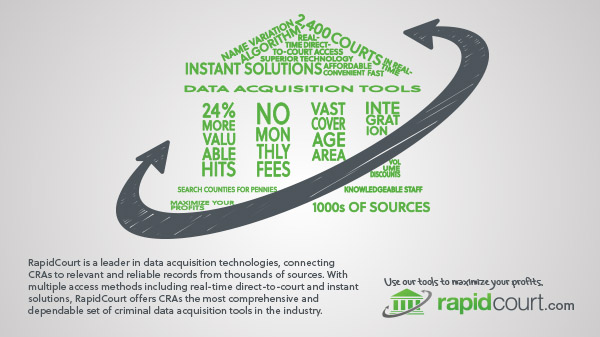
Public
Record Update
By Mike Sankey, PRRN
| BRB's
FREE RESOURCE CENTER |
For the MOST
COMPREHENSIVE RESOURCE describing all access methods, restrictions,
fees, and search procedures on over 26,000 government and private
agencies visit the Public Record Research System (PRRS-Web) .
We provide the extensive details and in-depth data you will not
find doing a Google search!
Other items
available at this site that you can download include:
- PRRN Logos
- For Both Web and Print
- Compliant
Form
- Model
Agreement Between a Researcher and a Background Screening Firm
(CRA)
- Researcher
Client Forms
- Public
Record Retrieval Industry Standards Manual
For more
information contact Michael Sankey at mike@brbpublications.com
or visit www.brbpublications.com/updates.aspx
| 2014
PRRN MEMBERSHIP DIRECTORY |

The PRRN
Membership Directory is Your Guide to Finding a Professional
On-Site Researcher Who Can:
- Search
Court Dockets in Person
- View and
Copy Pages From Case Files
- Obtain
Probate Documents
- Obtain
Copies of Liens and Judgments
- Search
Real Estate Records
- Search
All Local Recorded Documents
The Directory
is conveniently organized into two sections. The first allows
you to search for a retriever by state and county, indicating
the types of records these on-site retrievers search. The second
section provides a full profile of each member including contact
information, local retrieval areas, types of records retrieved,
billing terms, turnaround times and additional information.
Public Record Retriever Network (PRRN)
is the organization that has set the industry standards for the
retrieval of public record documents and with a Code of Professional
Conduct.
Please call or email Mike Sankey if you have any questions at
800-929-3811 or mike@brbpublications.com

Rhode
Island Bill Expands Background Checks for Third-party School Employees
Scott Sanford worked closely enough with East Greenwich schoolchildren
to give them treats on the school bus. But the friendly bus monitor
was not a "school employee." This meant he was not legally required
to pass a national criminal background check before he started
working with East Greenwich schoolchildren, including the son
of a state lawmaker. Sanford's employment with a third-party contractor
drew attention in November when the 35-year-old town resident
was arrested by state police on child pornography charges. The
father of the 11-year-old boy who rode on the bus with Sanford,
testified before state lawmakers in a bid to expand the state
law on criminal background checks. "What this bill does is it
simply tightens up the existing law that we have," Rep. Antonio
Giarrusso, R-East Greenwich, told the House Committee on Health
Education and Welfare. The bill adds employees of third-party
vendors and contract employees who work at schools to the list
of individuals who must pass a national criminal background check
under state law, said Special Assistant Attorney General Joee
M. Lindbeck. That new language and other changes would give greater
protection to children, Lindbeck said.
Read more

State Bill Would Regulate Health Care Navigators
Arizona has joined several other states considering measures that
would require extra licensing and background checks for health
exchange navigators who help people buy coverage. The state House
approved a bill that would require navigators to get a license
through the state Department of Insurance and to pass a criminal
background check. Proponents say the requirements protect consumers
who share private information such as Social Security numbers
from identity theft. But Democrats say the bill is an attempt
to slow down enrollment and that it's unnecessary because navigators
already have contracts with the federal government. "What we're
doing here is we're just handling the background checks and licensing
to make sure we're protecting our consumers," Arizona Rep. Paul
Boyer, R-Phoenix, said. Debbie McCune Davis, D-Phoenix, said Arizona
gave up its right to license navigators when it failed to adopt
its own state insurance exchange program. She said the Centers
for Medicare & Medicaid Services has already established guidelines
that regulate navigators, and that a judge struck down a similar
law in Missouri. The Arizona bill would not impose a fee or extra
training but it would bar anyone convicted of a misdemeanor involving
fraud or dishonesty from becoming a navigator.
Read more

| DATA
PROTECTION AND PRIVACY |
Privacy
Industry Index (PII): Data Breach Vendors
Protecting
data has value and you have to invest to make sure that data is
properly protected. Businesses must work with a large collection
of vendors from a variety of disciplines to reach their privacy
goals. From the legal advisors to the insurance companies to the
IT services and software, the IAPP has sought to wrap its arms
around the industry of privacy to get a handle on the universe
of privacy vendors. This is IAPP's first attempt at defining a
subset of the industry, step one of many to come.
Read more

FMCSA
Notice of Proposed Rulemaking - Commercial Driver's License Drug
and Alcohol Clearinghouse
On February 12th, the U.S. Department of Transportation's Federal
Motor Carrier Safety Administration ("FMCSA") announced a Notice
of Proposed Rulemaking ("NPRM") to establish a national drug and
alcohol clearinghouse for commercial driver's license ("CDL")
holders. The public comment period ends on April 21, 2014.
The proposed
rule would, among other things, "establish the terms of access
to the database, including the conditions under which information
would be submitted, accessed, maintained, updated, removed, and
released to prospective employers, current employers, and other
authorized entities."The NPRM's Executive Summary states, "[t]his
proposed rule would . . . require employers and service agents
to search the database for current and prospective employees'
positive drug and alcohol test results, and refusals to test,
as a condition of permitting those employees to perform safety-sensitive
functions." 3 FMCSA Administrator Anne S. Ferro
explained, "We are leveraging technology to create a one-stop
verification point to help companies hire drug and alcohol-free
drivers. This proposal moves us further down the road toward improving
safety for truck and bus companies, commercial drivers and the
motoring public everywhere."
Read
more

Bringing
Your Employees Down From Their High: Drug Testing and Legalized
Marijuana
Over the
years, most employers have implemented policies that prohibit
the use of illegal drugs during work hours or while on work-related
business. Many other employers have made drug testing part of
the standard onboarding process for all new employees. With the
legalization of marijuana in some states, a difficult conflict
exists regarding the applicability, enforceability and wisdom
of those policies as they regard employees who may use marijuana
legally. First, an employer should pay special attention to the
specific language within its drug use and testing policies. Second,
employers would be wise to pay special attention to what goals
they are trying to accomplish with their policy. Third, the employer
should consider carefully its willingness to discipline employees
who may use marijuana off the clock or while not on company business.
Finally, if drug testing is a part of the management of their
workforce, employers should take special steps to ensure that
the policies are compliant with local drug testing laws, and that
the policies are uniform in application so as not to trigger unwanted
scrutiny from the EEOC or other regulatory agencies.
Read more

Cross-Border Employers Must Take Care Before Implementing Drug-and-Alcohol-Testing
Policies at Non-U.S. Operations
Many U.S.-based
employers perform pre-employment, post-accident, or random drug
testing, and with some exceptions, are generally permitted wide
latitude in deciding when to conduct such tests. The U.S. attitude
toward drug testing does not necessarily translate to other countries,
however, where there may be different attitudes toward employee
privacy, in particular. U.S.-based employers can run into trouble
when attempting to impose those same testing requirements on a
foreign division or subsidiary. Before beginning international
operations, employers should consider that other countries may
have a different perspective on the employment relationship itself.
It is not uncommon for employers just beginning cross-border operations
to import wholesale their U.S. policies and practices, including
employee handbooks, EEO policies (including citing U.S. law!),
hiring, firing, and leave policies. When it comes to drug-testing
policies, however, employers should carefully consider the legal
landscape of the countries in which they operate prior to implementing
U.S.-based policies. Random drug and alcohol testing may not be
permissible in other jurisdictions. Unjustified testing can result
in fines, and even criminal sanctions in several European countries.
In general, employers should always check the law in each particular
jurisdiction in which they operate.
Read more

Pre-Offer
Drug Tests Violated Americans with Disabilities Act
Pre-offer
drug tests to determine the use of both legal and illegal drugs
violated the Americans with Disabilities Act's prohibition on
pre-offer medical inquiries, a federal court in Pennsylvania held
on March 6, 2014.
EEOC v. Grane Healthcare Co. and Ebensburg Care Center, LLC,
d/b/a Cambria Care Center , CV No. 3:10-250 (W. Dist. Pa.
Mar. 6, 2014) .
Defendants
conducted pre-offer medical examinations along with drug tests.
Although the purpose of the drug tests was to determine illegal
drug use (which is permissible under the ADA), four applicants
who tested positive testified that their positive drug test results
were due to the use of lawful prescription medications. The Court
held that the tests in this case clearly qualified as medical
examinations under the ADA, particularly because each applicant's
urine specimen was tested not only for drugs but for other medical
purposes - such as for glucose. For this reason, the drug tests
did not fall within the ADA's exception for tests "to determine
the illegal use of drugs."
Read more

Drug Testing Index™ Reports Drug Use Among American
Workers Declined 74% Over the Past 25 Years, Finds Unprecedented
Analysis of More Than 125 Million Workplace Urine Tests
Drug use among American workers declined dramatically
over the past 25 years, although the rate of positive test results
for certain drugs, including amphetamine and opiates, continues
to climb, according to a landmark analysis of workplace drug test
results released by Quest Diagnostics.
"Today's
Quest Diagnostics Drug Testing Index provides the best evidence
to date that the Drug-Free Workplace Act and the public and private
initiatives it helped to spur have led to steep declines in drug
use among much of the American workforce," said Laura Shelton,
executive director, Drug and Alcohol Testing Industry Association
(DATIA). "While more needs to be done to reduce illicit drug use
by workers, we should take heart from the tremendous progress
employers have made to create safer workplaces for millions of
Americans."
The DTI analysis examined more than 125 million urine drug tests
performed by Quest Diagnostics forensic toxicology laboratories
across the United States as a service for government and private
employers between 1988 and 2012. The analysis examined the annual
positivity rate for employees in positions subject to certain
federal safety regulations, such as truck drivers, train operators,
airline and nuclear power plant workers (federally mandated safety-sensitive
workers); workers primarily from private companies (U.S. general
workforce); and the results of both groups together (combined
U.S. workforce).
To read the key findings
from the analysis


Innovative Enterprises Introduces ACE™Real Time Criminal
Court Search Solution
Innovative
Enterprises, Inc., a strategic partner to the background screening
industry and expert provider of court research information products,
smart data solutions and ancillary services, announced the official
release of ACE™ Automated Criminal Extraction™, a
comprehensive criminal court research solution custom engineered
to serve the needs of professional background screening firms.
Designed
and developed exclusively by Innovative, ACE™ leverages
the fastest growing library of full data extraction sources in
the industry to automate the collection of criminal court record
information from available online sources. Using highly advanced
matching and analysis algorithms, ACE™ provides a much deeper
inspection of records than previously possible, enabling users
to specify a degree of precision down to a single character or
digit found anywhere within a name or identifier, delivering fewer
false positives and more actionable results. Built on rock solid
technology and delivered via a fully redundant, dynamically scalable
infrastructure, ACE™ intuitively responds to increased customer
demand to ensure high availability and industry-leading response
times, even during peak hours.
"ACE™ represents the next generation of automated criminal
court record research solutions, built by us from the ground up,"
stated Clifford J. Williams, Innovative's President and Chief
Operating Officer. "Unlike many competing products which rely
upon third-party software or reseller arrangements, we manage
the process from start to finish. This gives our customers the
flexibility to determine precisely how the product behaves and
responds, while affording us the unique opportunity to deliver
a superior solution at a better value."
ACE™
is available to qualified entities via direct web services integration,
through Innovative's secure web portal and through select industry
software provider partners.
For more
information, please visit http://www.knowthefacts.com.

CIC
Enters Mutual Marketing Partnership with Co-Signer, Inc.
CIC, the
nation's fastest growing tenant screening company, is pleased
to announce today, that the firm has entered into a mutual marketing
partnership with Co-Signer.com, the premier provider of residential
rent assurance and subsidiary of Co-Signer, Inc.
 With
over 28 years of experience in the multifamily housing industry
and an extensive national client base, CIC will offer Co-Signer.com's
Residential Rent Guarantee Program nationwide to existing clients,
on its website and throughout the industry. Co-Signer's program
will help property managers fill vacancies with potential tenants
that may have been previously underqualified. With
over 28 years of experience in the multifamily housing industry
and an extensive national client base, CIC will offer Co-Signer.com's
Residential Rent Guarantee Program nationwide to existing clients,
on its website and throughout the industry. Co-Signer's program
will help property managers fill vacancies with potential tenants
that may have been previously underqualified.
Co-Signer.com
will market CIC's extensive list of solutions including tenant
screening services, uniquely tailored for property managers, real
estate agents, and independent rental owners; as well as wholesale
data, and pre-employment screening by engaging their client base
through its new media and telemarketing channels.
Read more


Christina Marotta Joins FRS as Manager of Client Services
FRS is very
excited to welcome Christina Marotta to its team as Manager of
Client Services. Marotta joins FRS with more than 10 years of
experience in supporting the talent acquisition process for large
Fortune 100 firms at LexisNexis and most recently with First Advantage.
In this newly created role at FRS, Marotta will use her proven
success methodologies in managing high profile organizations to
lead FRS's support team in providing unmatched
client support to their 200+ CRA clients.
Marotta was
selected because she is a leader with a proven track record of
achievement in business client services. Her extensive experience
and credentials in management, along with her knowledge of compliance
requirements will enhance FRS's ability to serve their clients
in this environment where compliance requirements change rapidly.
"We were
very patient in our search for Christina to assist us and our
CRA client base in their strategic growth. She brings the right
combination of knowledge and experience that adds the next dimension
in our team dynamic" stated Vice President of Operations, Sam
McLamb. "We are very pleased to have her joining our team!"
Read
more

Jobless
Claims in U.S. Held Last Week Near Four-Month Low
The number
of Americans filing applications for unemployment benefits held
last week near the lowest level in almost four months, a sign
the labor market continues to strengthen. Jobless claims increased
by 5,000 to 320,000 in the week ended March 15, a Labor Department
report showed today in Washington. The median forecast of 51 economists
surveyed by Bloomberg called for an increase to 322,000. The four-week
average, a less volatile measure, fell to the lowest level since
late November.
A slowdown
in dismissals may pave the way for employers to take on more workers
once demand accelerates. Federal Reserve policymakers said yesterday
in a statement there is "sufficient underlying strength in the
broader economy to support ongoing improvement in labor-market
conditions," even as economic activity slowed during the winter
months.
Read more

| EVERIFY
& IMMIGRATION ISSUES |
How
Painful Can it Get? Recent Penalties for Noncompliance with Immigration
Law
Compliance-minded
companies always want to know, "What's the risk of non-compliance?"
Or, put another way, "How much will it hurt if we don't get it
right?" For those companies still wondering whether spending a
little now to implement a solid immigration compliance program
is a sound investment, some of the recent immigration-related
penalties provide compelling reasons to invest in training and
compliance. Remember − all employers have immigration-related
compliance obligations regardless of whether they employ any foreign
nationals. Some of the companies suffering significant penalties
never even had any unauthorized workers in their workforce, but
merely fell short on their obligation to verify employment eligibility
(the Form I-9 process) or discriminated against certain individuals
during the Form I-9 process. Penalties imposed in any given case
are always fact-dependent, and the employer's response to the
investigation can significantly impact the outcome of any investigation.
Taking a look at the recent penalties imposed provides a good
perspective of the risk. For example, after a Form I-9 inspection
in 2009, American Apparel lost 40% of its workforce and suffered
significant financial losses that it attributed to lost productivity,
causing its stock to drop 41% after reporting losses in the second
quarter of 2010.
Read more

Record Settlement for Allegations of Systemic
Visa Fraud and Abuse of Immigration Processes
Infosys Corporation,
an Indian company involved in consulting, technology, and outsourcing,
has agreed to a civil settlement of allegations of systemic visa
fraud and abuse of immigration processes by paying a record settlement
amount and agreeing to enhanced corporate compliance measures,
announced U.S. Attorney John M. Bales. The $34 million payment
made by Infosys as a result of these allegations represents the
largest payment ever levied in an immigration case.
Infosys is
located in thirty countries including the United States, and in
17 cities in the United States, including a location in Plano,
Texas. The Plano location is responsible for handling the immigration
practices and procedures for the United States operations of Infosys.
Infosys brings foreign nationals into the United States in order
to perform work and fulfill contracts with its customers under
two visa classification programs relevant to this matter, H-1B
and B-1.
According
to court documents, the government alleged instances of Infosys
circumventing the requirements, limitations, and governmental
oversight of the H-1B visa program by knowingly and unlawfully
using B-1 visa holders to perform skilled labor in order to fill
positions in the United States for employment that would otherwise
be performed by United States citizens or require legitimate H-1B
visa holders. The government also alleges that Infosys did so
in order to increase profits, minimize costs of securing visas,
increase flexibility of employee movement, obtain an unfair advantage
over competitors, and avoid tax liabilities.
Read more

Contact Barry
Nixon at 949-770-5264 or at wbnixon@aol.com
for more information.

What
Can We Do For You in 2014 To Help You Exceed Your Revenue
Goals? |

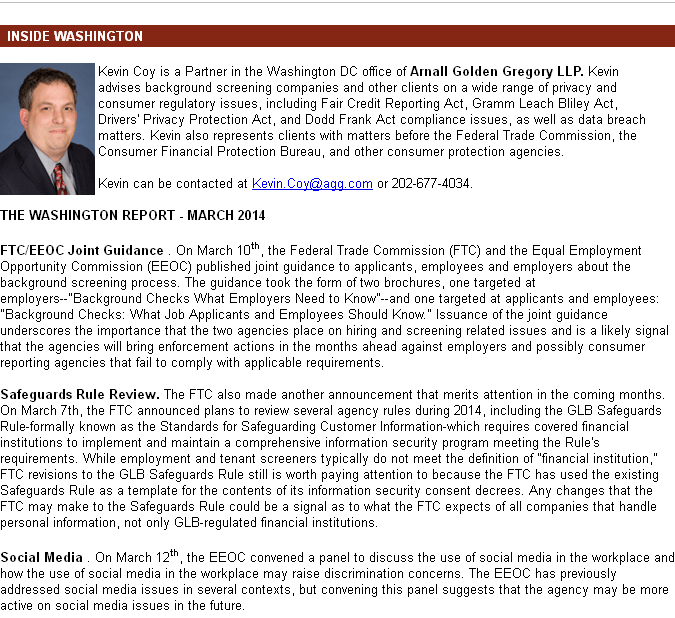
Read
the full report


Did
you know?
Criminologist Shawn Bushway of the University at Albany-SUNY,
research shows that the type of crime a job applicant has committed
is often less relevant than how long ago he committed it. Mr Bushway
found that likelihood of committing a crime narrows to almost
nothing after enough time-around 13 years.
Source: PI Magazine, November/December edition, Criminal Records
Are Becoming the New Hot Potato

One
Site! Many Suppliers! |
2013-2014
SUPPLIERS TO THE BACKGROUND SCREENING
INDUSTRY BUYERS GUIDE NOW AVAILABLE!
Looking for the Top Suppliers in the Industry? Need to find a
new Supplier?
Visit our VENDOR SHOWCASE
which features suppliers to the Background Screening Industry.

Click
here or on image to get a copy
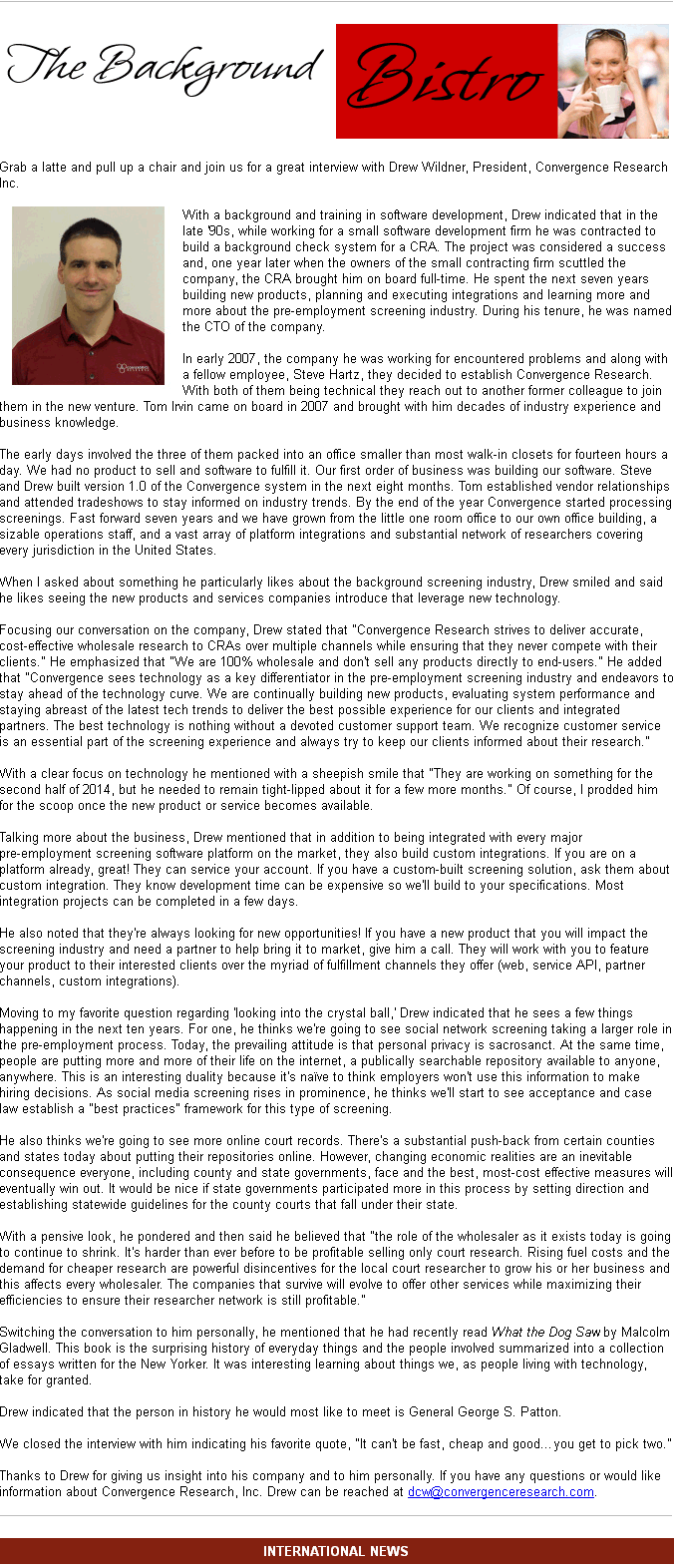
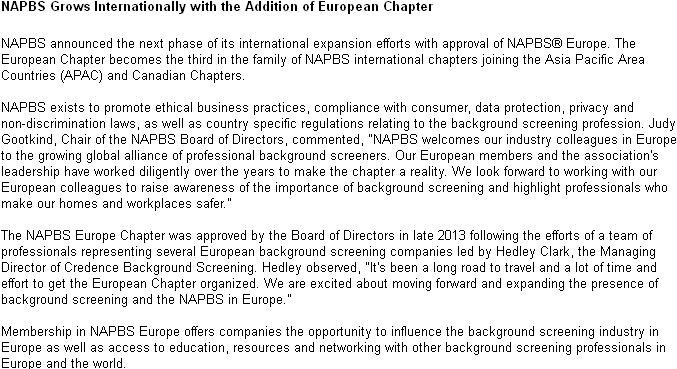
Read more

European
Regulators, FTC Unveil Cross-Border Data Transfer Tool
After a year of collaboration on the effort, the U.S. Federal
Trade Commission (FTC), together with data protection authorities
from around the world, held a press conference at the IAPP Global
Privacy Summit to announce a joint agreement between the G29 and
APEC countries aiming to aid companies in achieving compliance
with global data transfers. Isabelle Falque-Pierrotin, chairwoman
of the French Data Protection Authority (CNIL) and president of
the Article 29 Working Party, said the tool, called a "referential,"
is a "very political and symbolic act" for companies seeking to
obtain double certification under Europe's binding corporate rules
(BCRs) and APEC's cross-border privacy rules (CBPRs). The referential
is a pragmatic checklist that compares and identifies the common
principles among BCRs and CBPRs and aims to help companies identify
additional requirements they may need to comply with in order
for their data transfers to be legal. Falque-Pierrotin specified,
however, that the referential does not aim to create a mutual-recognition
system. FTC Chairwoman Edith Ramirez said the U.S. is committed
to continuing working with the EU on data transfer mechanisms
such as BCRs and Safe Harbor, and that's why this tool is an important
step in the dialogue.
Read more
Brazil
to Drop Local Data Storage Rule in Internet Bill
Brazil will
drop a controversial provision that would have forced global Internet
companies to store data on Brazilian users inside the country
to shield them from U.S. spying. The rule was added last year
to proposed Internet governance legislation after revelations
that the U.S. National Security Agency had spied on the digital
communications of Brazilians, including those of their President
Dilma Rousseff and the country's biggest company Petroleo Brasileiro
SA. Instead, the legislation will say that companies such as Google
Inc and Facebook Inc are subject to Brazilian laws in cases involving
information on Brazilians even if the data is stored abroad, said
congressional relations minister Ideli Salvatti. She said the
bill, which is opposed by Rousseff allies in the lower chamber
of Congress, has enough support to be put to the vote. Salvatti
said the government will not negotiate a key provision in the
bill on net neutrality, which has faced strong opposition from
telecom companies in Brazil because it would bar them from introducing
differential pricing according to Internet usage and speeds. The
legislation dubbed Brazil's "Internet Constitution" protects freedom
of expression, safeguards privacy and sets limits to the gathering
and use of metadata on Internet users.
Read more
CV Fraud at Epidemic Levels
An Auckland
private investigator claims 80 per cent of CVs his firm is called
in to check turn out to be false in some way. Other private investigators
and recruiters say while CV fraud is widespread, the number of
CVs that prove to be either misleading or outright incorrect is
more in the range of 15 to 20 per cent. They say private investigators
often get called in once a company already has suspicions over
a candidate.
It's a problem
that has been around for many years and it reared its ugly head
again last month when it was revealed Michael Vukcevic falsely
claimed to have a law degree from Victoria University when he
applied for the top job at multinational law and patent firm Baldwins.
PwC's 2014
Global Economic Crime Survey, out last month, found human-resources
fraud - which includes fake CVs - had for the first time become
one of the big five frauds affecting Kiwi businesses.
Read
more

Job
Seekers Need Clear Privacy Law
The law is
not always an ass, but it can produce an absurdity. The decision
of the Human Rights Review Tribunal to make a company disclose
to a failed job applicant the CVs and reference checks of others
going for a job is an example.
The aggrieved
party complained to the tribunal that he was discriminated against
on the basis of age. He wants to see the credentials of others
who applied or succeeded in the process. Under the court system's
rules of "discovery," which the tribunal adopts, all information
pertinent to an action needs to be handed over from the defendant
to the plaintiff. The tribunal has dismissed an application from
the company involved, Alpine Energy, to block that discovery under
a section of the Evidence Act which covers confidentiality.
So Alpine
and its recruitment agency must give the man the information it
has on the successful candidate and those who contested and lost.
This would include not only names, applications and CVs (although
the tribunal and the failed job-seeker have agreed it need not
include addresses and contact details) but also reference and
perhaps security checks.
The tribunal
recognised applicants would probably have expected their personal
information to be kept confidential. This decision, should it
stand, will put hurdles in the way of employers and would-be employees.
Read more

|
ADVERTISERS IN THIS EDITION |


|  |
|
|
| |
|
Background
Screening Jobs |
|
Visit
the Job Board for the Employment and Tenant Screening Industry.
Here you will find resumes of people with industry experience
and employers seeking applicants with experience in Employment
and Tenant Screening and related businesses.
www.backgroundscreeningjobs.com


|
UPCOMING CONFERENCES, COURSES & EVENTS |
Feature
Education:
 |
FCRA
Basic Certification Webinar Series Update
The
FCRA Basic Certification program series is now available
for purchase.
For
more information |
2014 Events ( Click
Here to View full list of Events ) - Updated
Monthly
SHRM
State Conferences, visit
http://www.shrm.org/Conferences/StateAffilliateConferences/Pages/default.aspx
Drug
and Alcohol Testing Industry Association (DATIA), 2013 Training
Course Schedule, visit
http://datia.org
SAPAA
Training Institute Learning Events, http://www.sapaa.com/
CUPA-HR
Conferences: http://www.cupahr.org/
World
Federation of People Management Associations, Events,
http://www.wfpma.com/events/by-region#quicktabs-tab-view__events__page_3-4
|
 Alo!
Alo!
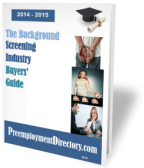 20,000 HR Managers are waiting to find out about your company!
20,000 HR Managers are waiting to find out about your company!










 With
over 28 years of experience in the multifamily housing industry
and an extensive national client base, CIC will offer
With
over 28 years of experience in the multifamily housing industry
and an extensive national client base, CIC will offer 









